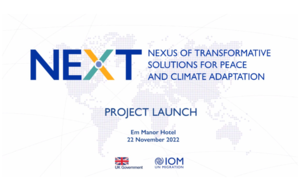IOM, UK launch BARMM's Conflict, Climate Change, & Mobility Nexus
The UN Migration Agency, IOM, with support from the UK Government, launched “Nexus of Transformative Solutions for Peace and Climate Adaptation”.

The UN Migration Agency, International Organization for Migration (IOM), with support from the Government of the United Kingdom (UK), launched the project “Nexus of Transformative Solutions for Peace and Climate Adaptation”. The project aims to build evidence on the interlinkages between conflict and climate change from a human mobility lens and to directly engage communities from provinces across the BARMM in participatory action research. Furthermore, it seeks to strengthen the socioeconomic resiliency to climate change in conflict-prone communities, with Shariff Aguak and Mamasapano in Maguindanao del Sur and Marawi City in Lanao del Sur as pilot communities.
“This is a milestone for the UK and the Bangsamoro Government as our first initiative to integrate climate change and peacebuilding objectives into local climate action and resilience-building in a conflict-affected context,” said Alistair White, the Deputy Head of the Mission of the British Embassy in the Philippines. The project builds on the continuous collaboration between IOM and the Government of the UK, which has contributed to key initiatives for sustainable peace in BARMM.” Alistair continued, “We will give our full support to this valuable partnership.”
The BARMM is in a state of transition as part of the joint implementation of the peace agreement. It continues to face security challenges with sporadic violence and conflict, clan feuds (rido), and the presence of non-state armed groups which are often driven by the lack of socioeconomic opportunities in resource-dependent communities. Meanwhile, the region also experiences multiple natural hazards which can result in slow to sudden onset disasters. Most recently, the BARMM was devasted by Severe Tropical Storm Paeng (international name: Nalgae) where massive flooding and landslides affected over one million persons and displaced more than 280,000 in the region.
“The project brings together the knowledge and experience of local stakeholders, shedding light on the increasingly emerging risks that affect communities left behind in the BARMM,” said Tristan A. Burnett, IOM Chief of Mission in the Philippines. “IOM hopes that the evidence and best practices identified during this project will help guide the BARMM and conflict-affected communities to mainstream adaptation and mitigation strategies to climate change,” continued Burnett.
Some studies have shown that climate emergencies can increase security risks by exacerbating preexisting socioeconomic and environmental vulnerabilities. They can cause depletion in resources, intensify tensions and inequality, and drive unwanted migration - all of which may potentially contribute to conflict.
“Poverty reduction, economic development, and peace and community building efforts all face obstacles of both conflict and climate change. Fragile communities have particularly significant challenges and constraints from climate change, especially in managing the risks from crisis and supporting climate change adaptation” said Hon. Ahod B. Ebrahim, the BARMM’s Chief Minister, emphasizing the need for better understanding of long-term approaches to address the potential effects of climate change on instability and conflicts in the region.
Through the video message, Hon. Ahod B. Ebrahim, further expressed his gratitude to the Government of the UK and IOM. Echoing his message, Engr. Mohajahirin T. Ali, MNSA. Director General of the Bangsamoro Planning and Development Authority, shared his message of appreciation and highlighted the project’s “contribution to BARMM during the crucial transition period” and in supporting efforts for sustainable peace and development in the region.